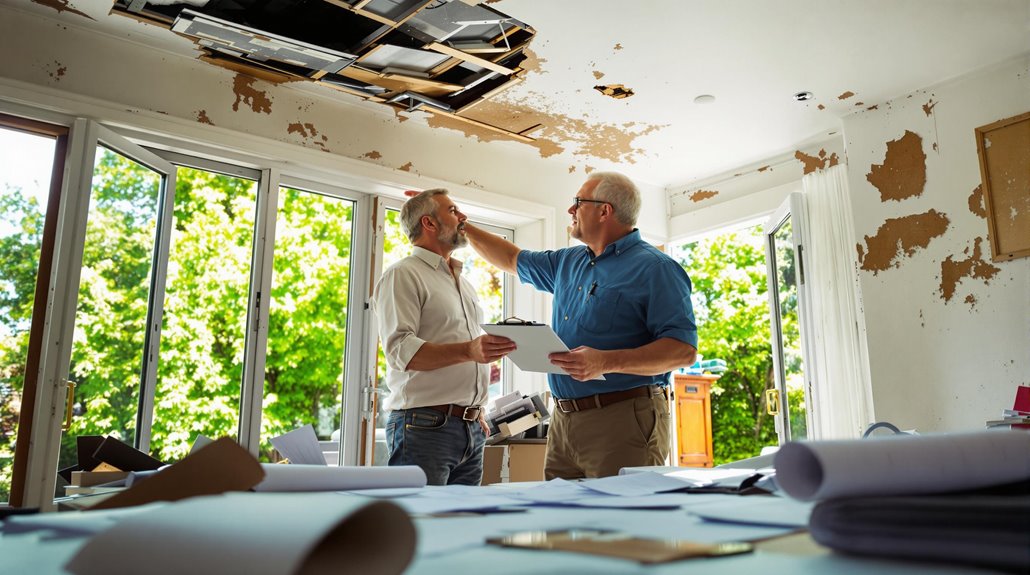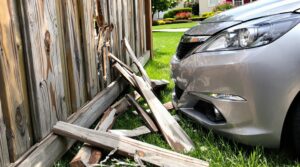Compensation for property damage is determined by evaluating the damage, estimating repair or replacement costs, and considering factors such as market value and type of damage. Various types of claims, including residential, commercial, and motor vehicle, are affected by different factors. Public adjusters can assist in maneuvering complex claims and negotiating with insurers. Understanding the process and factors involved is essential for securing fair compensation. Further exploration of this topic can lead to a more thorough grasp of the intricacies involved.
Key Takeaways
- Compensation for property damage is determined by assessing the extent of damage and estimating repair costs based on current market value and depreciation.
- Factors affecting property damage compensation include repair costs, replacement costs, fair market value, and type of damage, such as physical damage and loss of use.
- Insurers and public adjusters play a crucial role in the claims process, with public adjusters working on behalf of policyholders to ensure fair evaluations and settlements.
- Accurate and detailed documentation, including estimates and proof of payment, is essential in supporting compensation claims and navigating complex policies.
- Hiring a public adjuster can enhance claim settlements, with expertise resulting in increased settlement amounts by 20-50% and fees justified by increased compensation.
Determining Compensation for Property Damage
Property damage claims often present a complex array of factors to evaluate when determining compensation. To establish a valid claim, a thorough damage assessment is necessary to identify the extent of damage and estimate repair costs.
Repair valuation is a critical component of this process, involving the calculation of costs to restore the property to its original state. This may include obtaining quotes from contractors or appraisers to estimate repair costs. Additionally, the current market value of the property, depreciation, and market pricing for materials and labor are considered.
The goal of this assessment is to provide an accurate estimate of the costs required to repair or replace the damaged property. By considering these factors, claimants can establish a detailed and well-supported claim for compensation.
A thorough damage assessment and accurate repair valuation are essential in determining fair compensation for property damage. The claims determination period typically spans 30-60 days for insurance companies to evaluate and process standard property damage claims.
Types of Property Damage Claims

Numerous types of property damage claims exist, each with distinct characteristics and requirements.
Property damage claims can be categorized based on the type of property affected. The following are three common types of property damage claims:
1. Residential Claims: These claims involve damage to personal residences, such as homes and apartments, and are typically covered under homeowner's insurance policies.
Examples of residential claims include damage from storms, fires, and theft.
2. Commercial Claims: These claims involve damage to business properties, such as buildings, vehicles, and equipment, and are typically covered under business insurance policies.
Examples of commercial claims include damage from fires, explosions, and busted plumbing.
3. Motor Vehicle Claims: These claims involve damage to vehicles and are typically covered under automotive insurance policies.
Examples of motor vehicle claims include damage from collisions, theft, and natural events like hail or floods.
Public adjusters can assist property owners in understanding their policies and navigating complex damage claims.
Factors Affecting Property Damage Compensation

When evaluating property damage claims, the amount of compensation awarded is influenced by a range of factors, which can greatly impact the claim's outcome.
These factors include repair costs, replacement costs, fair market value, consequential costs, and devaluation. The type of property damage, such as physical damage, loss of use, and incidental expenses, also plays an essential role in determining compensation.
Additionally, legal considerations, such as foreseeability, duty to mitigate, negligence, and jurisdictional laws, can affect the amount of compensation awarded.
In the process of property restoration, compensation negotiation takes into account these various factors to guarantee a fair settlement. Understanding these factors is vital for individuals and businesses seeking to maximize their compensation.
By considering these factors, claimants can navigate the complex process of compensation negotiation and work towards a successful resolution of their property damage claim.
Working with public adjusters can increase settlement amounts by 30-50% compared to handling claims independently.
Effective compensation negotiation is critical to achieving a favorable outcome.
The Role of Insurers and Public Adjusters in Compensation

The process of compensation negotiation for property damage claims often involves the participation of two key entities: insurers and public adjusters. Insurers employ adjusters who represent the insurance company and are responsible for investigating, negotiating, and settling losses.
In contrast, public adjusters work on behalf of the policyholder to evaluate damage, determine the scope of repairs, and estimate replacement values.
The following are key aspects of insurer responsibilities and public adjuster benefits:
- Insurer representation: Insurer adjusters represent the insurance company, while public adjusters represent the policyholder.
- Claim negotiation: Public adjusters can negotiate higher settlement amounts than what is initially offered by the insurer.
- Public adjuster benefits: Hiring a public adjuster can provide expertise in evaluating damage and estimating repair costs, which can be essential in large or complex claims, leading to fair compensation and reduced stress for policyholders.
Studies have shown that policyholders who work with public adjusters achieve settlements that are 800% higher compared to those who handle claims independently.
Legal Considerations for Compensation Claims

As compensation claims for property damage are navigated, legal considerations play an essential role in determining the outcome.
A thorough investigation, potentially involving forensic engineering, is often necessary to establish liability and determine the root cause of the damage. This liability evaluation is vital in identifying the responsible parties and gauging the total value of the damaged property.
Understanding the relevant legal frameworks is also significant, as claims can be filed against anyone who causes damage to property.
The process typically involves alerting insurance companies, securing the property, and scheduling an insurance adjuster visit. Claims may be resolved through mutual agreements or court proceedings, with the statute of limitations for property damage claims varying by jurisdiction, such as three years in California and Nevada.
Proper documentation, including estimates and proof of payment, is essential for building a strong case and securing fair compensation.
Working with public adjusters can increase property damage claim settlements by 30-50% through their expertise in navigating complex cases.
The Benefits Of Consulting A Public Adjuster

Consulting a public adjuster can provide several benefits for property owners seeking compensation for damage.
These professionals bring expertise in insurance claims, enabling them to navigate complex policies and procedures, and provide an objective assessment of damage to guarantee accurate claim submission.
The Public Claims Adjusters Network maintains strict professional standards including 24-hour communication response times and regular client updates every 10 days.
Expertise In Insurance Claims
Engaging the services of a public adjuster brings specialized expertise to the insurance claims process, providing policyholders with a distinct advantage in managing complex insurance policies and procedures.
A public adjuster's expertise is vital in maneuvering the intricacies of insurance claims, guaranteeing policyholders receive fair compensation for damages.
Public adjusters typically charge 5-20% contingency fee based on the final settlement amount secured for the policyholder.
The benefits of a public adjuster's expertise in insurance claims include:
- Comprehensive policy knowledge: In-depth understanding of insurance policy terms and conditions to guarantee maximum benefit entitlement.
- Effective claim strategies: Skilled negotiation with insurance companies to secure fair settlements and advocacy on behalf of policyholders to prevent underpayment.
- Streamlined claims process: Efficient management of paperwork, procedural requirements, and communication with insurance companies, minimizing policyholder burden and stress.
Objective Damage Assessment
How accurately are damages assessed following a potentially damaging event? Objective damage assessment methods conducted by professionals play an essential role in determining the condition of a property.
A systematic evaluation of losses involves on-site inspections, data collection, loss estimation, liability determination, and thorough documentation. Public adjusters utilize detailed inspections to identify all damages, including hidden ones, and evaluate them independently to provide a fair estimate of repair or replacement costs.
Employing assessment techniques, public adjusters guarantee accurate data collection, reducing disputes and enabling fair compensation. Their expertise in insurance policies allows them to identify all covered damages, maximizing settlements for policyholders.
Effective damage evaluation by a public adjuster is vital in securing fair compensation following a damaging event. Studies show that engaging a public adjuster can lead to increased settlement amounts of 20-50% compared to handling claims independently.
Streamlined Claim Process
Numerous benefits arise from utilizing the expertise of a public adjuster to navigate the claims process. A streamlined claim process can be achieved through their thorough and efficient claim documentation and negotiation strategies.
Key advantages of consulting a public adjuster include:
- Accurate and Efficient Documentation: Public adjusters gather extensive documentation to support the claim, utilizing various tools and preparing detailed reports to strengthen the case.
- Expert Navigation and Negotiation: They evaluate covered damages and negotiate fair settlements with insurance companies, interpreting complex policies and ensuring fair treatment.
- Professional Representation: Public adjusters exclusively represent policyholders, leveling the playing field in negotiations and empowering them to secure fair compensation for damages.
Licensed professionals must maintain strict legal independence from both insurance companies and roofing contractors to ensure unbiased advocacy for homeowners.
Higher Claim Payouts & Settlements
While maneuvering through the complex process of filing an insurance claim, policyholders often face the challenge of ensuring they receive fair compensation for damages to their property. Consulting a public adjuster can considerably increase the likelihood of higher claim payouts and settlements.
Public adjusters possess expert knowledge of insurance policies and procedures, allowing them to devise effective claims strategies and employ skilled negotiation techniques with insurance companies. By accurately evaluating property damage and preparing detailed documentation, public adjusters can advocate for policyholders' rights and challenge undervaluations.
Studies have shown that policyholders who hire public adjusters tend to receive higher payouts compared to those who rely solely on insurance company adjusters. This expert representation can also alleviate policyholders' burdens, saving time and reducing stress. Though they typically charge up to 10% of the final settlement amount, public adjusters' expertise often results in substantially higher payouts that justify their fees.
About The Public Claims Adjusters Network (PCAN)

The majority of licensed public adjusters operate independently or as part of a larger firm; however, a select group have chosen to affiliate with the Public Claims Adjusters Network (PCAN), a professional organization that facilitates access to resources, networking opportunities, and best practices in the field of public adjusting.
By joining PCAN, public adjusters can enhance their Public Adjuster Qualifications and gain a competitive edge in the industry.
Some of the key benefits of joining PCAN include:
- Access to Industry Events: Members can participate in conferences, seminars, and workshops to stay updated on industry developments and best practices.
- Network Benefits: PCAN provides a platform for public adjusters to connect with peers, share knowledge, and collaborate on cases.
- Professional Development: The organization offers training and educational resources to help public adjusters improve their skills and expertise.
References
- https://www.landesblosch.com/blog/property-damage-insurance-claims-process-what-to-expect
- https://www.cbtrial.com/how-to-make-a-property-damage-claim/
- https://manuu.edu.in/dde/sites/default/files/DDE/DDE-SelfLearnmaterial/BA-6thSemester/Englishba6th28may24.pdf
- https://www.cochranfirm.com/property-damage-claims/
- https://www.adjustersinternational.com/resources/news-and-events/how-to-file-a-homeowners-property-damage-insurance-claim/
- https://www.justia.com/trials-litigation/docs/property-damages/
- https://shinerlawgroup.com/common-factors-that-affect-a-personal-injury-case/
- https://ftp.idu.ac.id/wp-content/uploads/ebook/ip/BUKU MANAJEMEN SAFETY/SAFETY INDUSTRY/Principles of Forensic Engineering Applied to Industrial Accidents by Luca Fiorentini
- https://policyadvocate.com/blog/how-is-the-value-of-my-property-damage-claim-determined/
- https://gautreauxlawfirm.com/value-of-a-personal-injury-case/








